- Home
- Stacey Kade
For This Life Only Page 2
For This Life Only Read online
Page 2
My dad was proud of me, of all of us, but it was like in this general, generic way. He didn’t know my stats or that I struggled with my circle changeup and was contemplating switching to the Vulcan. With too many competing Riverwoods priorities, he didn’t have space in his brain for that kind of information.
Movement on the other side of the fire caught my attention. Kylie approached the outer edge of the light, her puffy white coat bright in the surrounding dimness. Her dark hair was mostly stuffed under a blue-and-gray beanie, the one I’d given her for her birthday last year. We were friends first. Her brother, Scott, was our center fielder, so she’d been hanging around team events for years.
That only made it worse when she dumped my ass last month at a party after telling me “it’s not working.” But lately, for some reason, she kept wanting to talk to me, to explain. To try to make things better. How exactly was talking going to make it better? Especially when she was with that dude from St. Luke’s? She’d brought him tonight. I could see him talking to Scott behind her.
No thanks.
Kylie gave a tentative wave in my direction, her red cup clutched in her other hand.
I turned away and took three big swallows to finish my beer. “I should probably be getting home,” I said to Derek, chucking my cup into the fire.
“Pussy,” Caleb coughed into his fist.
I ignored him. “Anyone seen Zach?”
Lacey pointed to a dim corner of the barn, where I could barely make out two figures, arguing quietly with wild hand gestures and wobbly balance. A glass bottle of some kind of liquor was on the ground nearby, the side of it flickering with the reflection of firelight. “Um, he and Audrey are . . .”
Damn it. My best friend was always DD because he didn’t drink. Except when he and his on-again, off-again girlfriend were fighting.
“I can take you home,” Kylie offered, her voice carrying a little too loud across the fire. “I haven’t touched my beer yet, and Dylan has his car—”
“I’ve got it,” I muttered. I’d get Zach’s keys and borrow his car. I’d only had a couple, and not even full cups because Caleb didn’t know how to fucking pour.
Turning on my heel, I moved away from the fire and headed into the barn.
“Zach,” I shouted, giving plenty of advance warning in case there was some deeply personal shit going on. I’d been present for their fights before, and Audrey didn’t filter much when she was pissed. I’d heard plenty about their sex life. And I didn’t need to know that much about either one of them. “Keys, bro.”
Audrey gave an exaggerated huff at the interruption.
“One sec,” Zach said to her before turning to me, half stumbling with movement. “You’ve been drinking.”
I rolled my eyes. “Less than you,” I pointed out. “I’m fine.”
He squinted at me blearily. “Are you sure? You could stay here. Everyone else is.”
Everyone including Kylie and her boyfriend? Hell, no.
I didn’t feel the same way about her anymore. It would be hard to after getting my heart stomped on with such force and precision, but that didn’t mean I wanted to hang out with her or, worse yet, try to dodge her various “we need to talk” attempts through the whole night.
Why couldn’t she do the normal thing and pretend we never knew each other?
“I have to get home. Now,” I said to Zach. “Church tomorrow, remember?” It would be difficult enough to explain why I had Zach’s car; I didn’t want to be late too.
He nodded after a second, a delayed reaction, and then pulled his keys from his pocket and tossed them to me. “Your mouthwash is in the glove box from last time.”
I caught his sloppy toss one-handed, snatching the keys out of the air and turning to . . .
. . . charge smack into Kylie, who’d evidently followed me.
On impact, her red plastic cup, caught between us, gave a loud crack and I felt the cold slop of liquid against my chest.
A quick look down revealed beer in a large, spreading stain on my red T-shirt and sprayed across the left side of my coat.
“Oh, my God, Jace, I’m so sorry.” She wiped her hand on her jacket and tried to reach for me.
I moved out of her reach, holding my dripping shirt away from me before trying to wring it out. Beer dribbled out from between my fingers and onto the ground, but not enough. I could feel it soaking the long-sleeved shirt I had underneath as well. Even if I took off my coat and managed to get dry, the smell would still be too strong.
A voice in the back of my head began to chant shit, shit, shit with an ever-increasing degree of panic.
“I wanted to make sure you—” Kylie began.
“It’s fine,” I said sharply. “I’m fine. Just stop.”
Hurt flickered across her face before she turned and stalked away, but I ignored her in favor of bigger problems.
I was screwed.
It was risky enough to drive after a couple of beers when I was four years from legal, but getting behind the wheel smelling like the Wrigley bleachers after a particularly disheartening Cubs loss was a monumentally bad idea. And even if I made it home without getting pulled over, there was no way I was getting past my parents.
Not without help. That only left me with one option.
Fuck.
• • •
The rumble of the deteriorating muffler on our Jeep Cherokee was distinctive enough that I heard Eli coming a mile away and was reaching for the door handle before he came to a complete stop.
“What took you so long?” I asked, my teeth chattering. “Did Mom and Dad give you crap about coming to get me?” The outer shell of my coat was stiff in patches where the beer had soaked in and then frozen. I had no idea what temperature beer froze at, but away from the shelter of the barn and the bonfire, I’d found it.
“I think the standard response is actually ‘thank you,’ ” Eli said.
I slid in and yanked the door shut after me, cutting off the distant sounds of the party behind me.
“Right. Sorry, thanks.” Not bothering with my seat belt, I stripped out of my jacket, shivering despite the heat blasting out of the vents in the ancient Jeep.
Eli nodded, a tight movement that told me he was a little exasperated with me. It was exhausting being the good and responsible one all the time. Or so I assumed.
“Did you bring me a shirt?” I asked.
He pointed toward the backseat.
“Thanks.” I twisted in my seat and grabbed for the neatly folded clothing. “Seriously?” I asked, holding up his debate team sweatshirt. BIG TALK, BIG WALK was emblazoned across the front in embarrassingly huge letters. It was almost as bad as his church camp T-shirt.
“It’s all I had with me.”
I pulled my beer-soaked shirts over my head and dropped them to the plastic floor mat next to my jacket. I’d have to find a way to slip them all into the laundry later. “Dude, my room is right—”
“I wasn’t at home,” he said.
That surprised me. I paused with his sweatshirt halfway over my head. I was usually the one cutting it close to curfew. Eli was always home in plenty of time. “Where were you?” No way he was still at Leah’s this late. Her curfew was even earlier than ours.
He didn’t answer right away, concentrating on the shiny black ribbon of road and driving exactly three miles an hour below the speed limit, and I finished pulling on the sweatshirt.
“How do you know the right thing to do?” he asked finally, his fingers fidgeting on the wheel. “When both options mean hurting people, I mean.”
I stared at him. His shoulders were slumped forward, making him almost hunched over the wheel. “Are you cheating on Leah?” I asked.
“No! Just forget it.” Eli accelerated slightly, as if by speeding he could leave the conversation behind.
I’d never seen him like this before. “No, no, wait.” I held up my hand. “What’s going on? Is this what was bugging you earlier?”
Eli sighed.
“Sorry. I can’t . . .” He hesitated. “Do you think there’s a difference between doing the right thing that definitely hurts one person and doing the right thing that might hurt a lot of people?”
I felt the first dart of worry. “Eli, what are you—”
“I mean, in theory,” he added.
I groaned. “It’s Saturday, Eli. Come on. Take a night off.”
Eli and my dad loved going round and round on heavy philosophical or religious issues. What is reality? How do we know what’s real? How you do you define the greater good? I found it all mind-numbingly boring. Things weren’t that complicated. Try not to be a crappy person. Go to church. Use your talents instead of burying them or whatever. If you do a good enough job, when you die, you go to heaven.
“I know what day it is,” Eli said sharply.
“All right, so sorry, Touchy,” I said, holding my hands up in surrender, which was usually enough to trigger a grouchy mumble or a reluctant smile.
But he didn’t say anything.
With an impatient sigh, I turned in my seat to face him. “Look, E, no matter what’s rolling around in that giant brain of yours, you have to know that you’re on the right side of things. You always are. You’re the good one, remember?”
I tried not to sound bitter. I mean, that was the deal with being half of a whole. Most of the time, what you were was in comparison to someone else. If one of us was good, the other was bad, simply by being less good.
Add to that the lore surrounding the children of ministers—you were either an innocent, naive angel or you were hell spawn, sent to test your parents’ patience and dedication—and our roles were pretty much set. And yeah, okay, I’d made it my mission to make sure that my reputation wasn’t exactly unearned.
Eli made a frustrated noise and braked to slow down as we crossed the bridge over the creek that ran through Zach’s parents’ land. “But that’s just it. I don’t know if I am. Have you ever . . .” He shook his head. “I guess sometimes I wonder if the—”
Before he could finish his thought, the car gave a weird but distinct shimmy that made my stomach sink. Having put the car in the ditch once last year, I recognized the sensation instantly: the wheels had lost contact with the road.
Panic rose over me in a cold rush.
The moment slowed down to a crawl as we started to slide sideways. The antilock brakes kicked in with a horrible grinding noise, and Eli struggled with the wheel.
“Wait,” he said, panicked. “Wait!” I wasn’t sure who he was talking to.
“Turn into it!” I reached, for him, for the wheel. Both, maybe.
But it was too late for either.
The back end of the car hit the guardrail with an enormously loud crash of metal on metal, and then the guardrail gave. I felt the lurch of regular gravity retracting, abandoning us to our fate.
The sound of my heartbeat filled my ears, muting the chattering of the radio and the shriek of tearing metal as the Jeep rolled, turning our world upside down.
A bright blue umbrella, neatly folded and in its carrying sleeve, flew up from the floor somewhere with a rain of dirt and old receipts. The smell of burning plastic and oil was chokingly thick.
My body lifted up and out of the seat, in that sickening defiance of physics that felt familiar from roller coasters, and then I was thrown forward and sideways, with no restraint.
When my elbow connected with the dashboard, I heard a distinct crack. That’s bad. That’s bad!
And then I caught one last glimpse of Eli, his eyes wide and his face—our face—pale in the dashboard lights, as he spun away from me.
CHAPTER THREE
* * *
THE BEEPING—DISTINCT, RHYTHMIC, AND from somewhere on my left—came first.
“Okay, Jacob, take it easy,” someone said, the voice low and soothing. “You’re coming out from under the meds, and it’s going to be a little disorienting. But you’re in the hospital, and you’re safe.”
I didn’t recognize the voice, which scared me, and the beeping sound accelerated.
“The noise you’re hearing is the heart monitor. Can you open your eyes?” he, the voice, asked, and I realized belatedly that it was dark around me.
With an effort that felt like swimming up through layers of mud, I tried to blink.
A sliver of bright light broke through on one side, and I winced, tears running down the right side of my face. But the left side felt puffy and numb.
I blinked again, managing to keep my eyes . . . my eye open for a few seconds longer. Enough to see my mom, her face chalky white and pinched with worry, holding my hand. Sarah was perched on the plastic-looking recliner with her, watching warily, with Patsie, her worn stuffed dog, in her lap.
“Hi, baby,” Mom said, tears filling her eyes and rolling down her cheeks. She squeezed my right hand carefully, avoiding the IV needle stuck in the back of it.
My dad was at the foot of the bed, his reading glasses pushed up and lost or forgotten in his rumpled dark hair. He touched my foot, but hesitantly, as if it might break. “Welcome back, Jacob.” His voice was thick, almost foreign sounding, and he looked away almost immediately.
“What . . .” But making that small sound felt like swallowing razor blades with the sharp edges up, and my eyes watered more fiercely at the pain.
My mom clucked at me in distress. “You shouldn’t try to talk.” She held a small plastic cup with a straw to my mouth, and I took a cautious sip, the water offering a passing moment of cold relief in my throat. “They just took the breathing tube out this morning. And you’re still on oxygen.”
Breathing tube. “What . . . happened?” I could feel the scrape of plastic in my nose and see the flaps of tape on my cheek, probably where the oxygen line was attached.
“Do you remember the accident?” my mom asked, squeezing my hand tighter.
At first, I couldn’t remember anything but the darkness, a pitch-black nothingness from which I’d emerged. But then pieces came back slowly, then fell into place.
“Eli. The Jeep. He came to get me.” It was like remembering a dream from years ago. “The bridge.”
I struggled to sit up, only to find that the entire left side of my body wouldn’t move.
“Easy,” the unknown voice said to my left, out of my range of sight. “We’ve spent a lot of time putting you back together.”
With effort and a growing weight of dread in my stomach, I turned my head carefully.
A man in scrubs and a white coat was on the left side of my bed, scrawling notes in a chart. But that wasn’t the worst part.
My left arm was four times its normal size with bandages, and now that I was looking at it, I could feel the throbbing and sizzle of nerves that felt frayed. And my left leg, beneath the blankets, appeared to be equally swollen and lumpy with bandages.
He set the clipboard down on my bed and flipped a penlight on to shine in my eye, peeling back an eyelid that wouldn’t respond to my commands. “Your left eye is swollen shut, but as soon as the inflammation goes down, your sight should be fine. Dr. Sheffield, the neurologist, will be down a little later.”
“My arm,” I managed.
The doctor turned off the penlight and retrieved his clipboard. “Open fracture of the olecranon process. We’ve set it surgically.” He shrugged, seemingly unconcerned. “With rehab and time, you’ll have eighty to ninety percent of normal motion back.”
That’s not enough, a panicked voice shouted in my head.
But I had to ask. “Baseball?”
“Sure, someday,” he said, already lost in whatever notes he was writing down.
My dad cleared his throat. “Jacob is left-handed. He is . . . he was a pitcher.”
The doctor hesitated, which told me everything I didn’t want to know. “I think you should concentrate on healing for now.”
Nausea swirled over me like fog, and I dropped my head back on the pillows. No more pitching? No more baseball? Not ever?
The doctor frown
ed down at me, as if I’d insulted him. “You weren’t wearing a seat belt. You’re incredibly lucky to be alive, young man.” Then, as if he feared that wasn’t enough to impress me, he pointed his pen at me. “You died en route to the hospital. More than once. Took a few tries to keep your heart going. You’re lucky someone found you when they did.”
I died? The bed seemed to tilt under me like I was falling, though I knew I was lying down.
“It’s a miracle,” my mom said, trying to smile through her tears. “God was watching over you.”
I tried to remember. Dying seemed like it should be one of those things that stuck with you. But between now and the accident—seeing Eli spin away from me—all I had was that inky, suffocating blackness. More than a blank space in my memory, it felt like a complete absence of everything.
What was that? Where was I when that was happening? Was I just gone?
That wasn’t supposed to be the way it worked. Eli had given me crap about telling Sarah about the bright light and heaven, but wasn’t that the way it was supposed to go? Or something close? Not just . . . nothing.
I could feel cold welling up in me, like my heart was suddenly pumping the icy water from the creek we’d crashed into.
But before I had time to fully process what any of that meant, the doctor’s final words jostled for my attention.
You’re lucky someone found you when they did. Someone had to find me? But that didn’t make any sense. Eli was right there and wearing his seat belt, like a good, responsible citizen. He should have been able to call 911 and do CPR.
Suddenly, his absence from my room seemed enormous and ominous.
“Where’s Eli?” I asked, trying to ignore the flicker of warning in the back of my brain and the tension coiling in my gut.
The atmosphere in the room immediately shifted. My mom sucked in a sharp breath and dropped her gaze to the floor, and my father turned away, scrubbing his hands over his face.

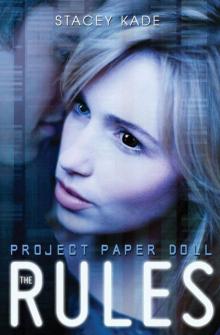 The Rules
The Rules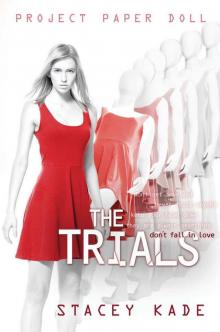 The Trials
The Trials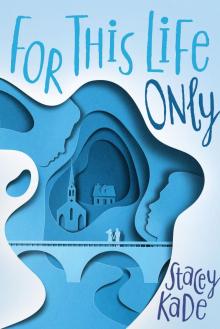 For This Life Only
For This Life Only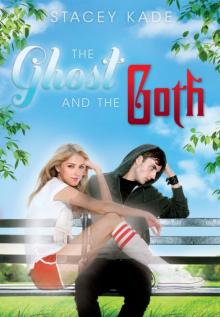 The Ghost and the Goth
The Ghost and the Goth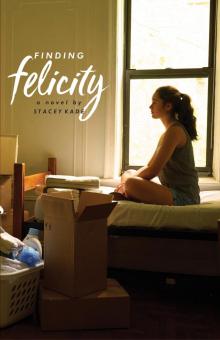 Finding Felicity
Finding Felicity The Hunt
The Hunt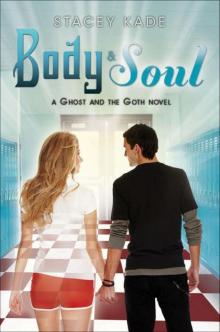 Body & Soul
Body & Soul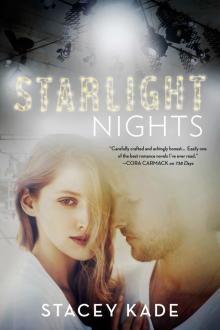 Starlight Nights
Starlight Nights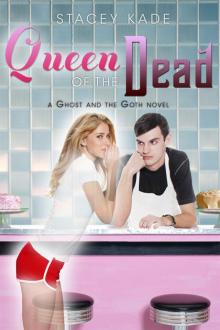 Queen of the Dead tgatg-2
Queen of the Dead tgatg-2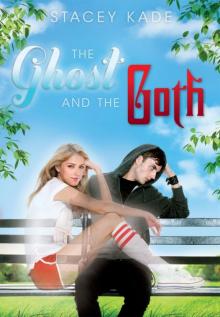 The Ghost and the Goth tgatg-1
The Ghost and the Goth tgatg-1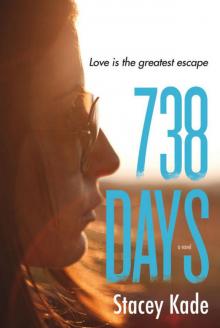 738 Days: A Novel
738 Days: A Novel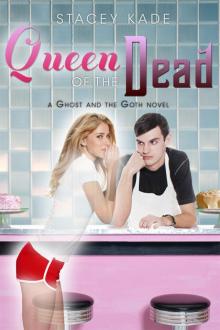 The Ghost and the Goth 2 - Queen of the Dead
The Ghost and the Goth 2 - Queen of the Dead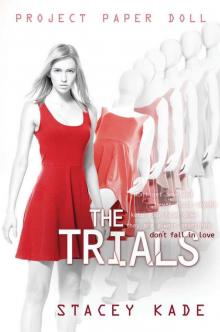 Project Paper Doll: The Trials
Project Paper Doll: The Trials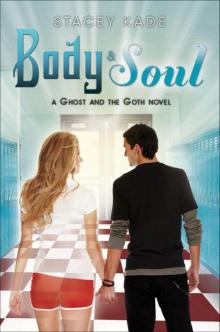 Body & Soul (Ghost and the Goth Novels)
Body & Soul (Ghost and the Goth Novels)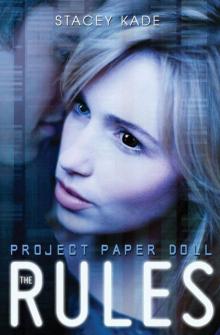 Project Paper Doll
Project Paper Doll